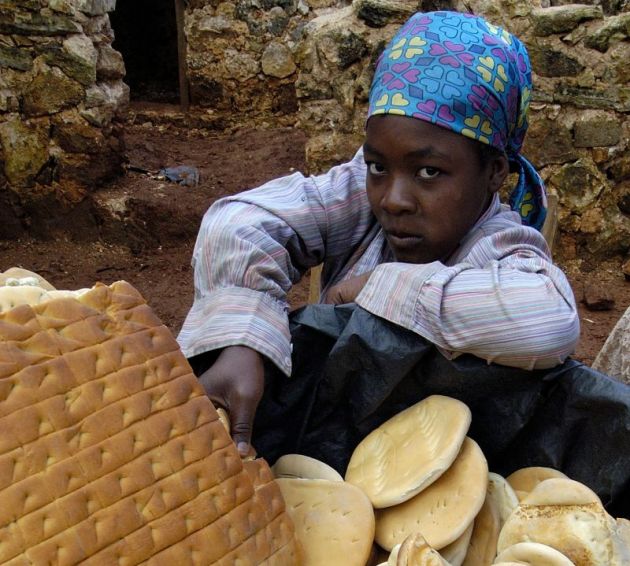World Food Program's Nobel Peace Prize shines light on global hunger

The World Council of Churches has joined the rest of the plant in welcoming the award of the 2020 Nobel Peace Prize to the UN World Food Program, one of the world's first responders in global crises.
"We express our gratitude and congratulations to the leadership and each staff member of the World Food Program," said Rev. Ioan Sauca, WCC interim general secretary.
Oxafam released as report soon after say the threat of "COVID famines" and widespread extreme hunger is setting off every alarm bell within the international community, but so far sluggish funding is hampering humanitarian agencies' efforts to deliver urgent assistance to people in need.
A new Oxfam analysis says that the international community's response to global food insecurity has been dangerously inadequate.
The report, "Later Will Be Too Late", is aimed at the Committee for World Food Security's (CFS) high-level event today which is hoped to "keep food security and nutrition front-and-centere of the global sustainable development agenda."
In Yemen, DRC, Nigeria, Burkina Faso and Somalia – that is, five of the seven countries where severe hunger continues to increase – donors have so far given no money at all for the "COVID-related nutrition assistance" part of the UN's $10.34 billion humanitarian appeal.
"This vital multilateral organization comprises many dedicated people, working in the remotest and most vulnerable regions of the world, affected by conflict, climate catastrophe and economic crises."
The WFP's spokesman Tomson Phiri was briefing journalists at the UN in Geneva when then announcement was made and said he views the Nobel Peace Prize as recognition of those struggling to prevent starvation around the world.
"This is a proud moment. The nomination in itself was enough. But to then go on and be named the Nobel Peace Prize winner is nothing short of a feat," he said.
"This is an organization I have served for nine years. I have seen the extent to which the people who are dedicated across the globe go the extra mile," said Phiri from Zimbabwe.
"Just before I moved to Geneva, I was based in South Sudan, where people would walk on foot to serve humanity. And it's really a proud moment. I really feel honored to be a member of this," he noted.
WFP WORKERS' SACRIFICES
The first thing that came to his mind when he heard the announcement was, "I thought of all my colleagues whom I've worked with in many countries, all the sacrifices that they do sometimes under conditions of insecurity. I think this is for them."
Earlier WFP's U.S. Executive Director David Beasley tweeted on hearing of the award that he as "deeply humbled" by the announcement.
"This is an incredible recognition of the dedication of the WFP family, working to end hunger everyday in 80 countries," he wrote.
The United Nations estimates that the world recession caused by the COVID-19 crisis pushed an additional 83 to 132 million people into hunger with women and children usually those most at risk.
World Food Program received the award "for its efforts to combat hunger, for its contribution to bettering conditions for peace in conflict-affected areas. And for acting as a driving force in efforts to prevent the use of hunger as a weapon of war and conflict," said Nobel committee chairman Berit Reiss-Andersen in speaking about the award.
The award announced in Oslo each year comes with a gold medal and prize money of 10 million Swedish kronor or U.S.$1.1 million. It is courtesy of a bequest left 124 years ago by the prize's creator, Swedish inventor Alfred Nobel.
"We expect the Nobel Peace Prize to also help us going forward in not only shining the light on ourselves, but shining the light on the work that we do," said Phiri.
The WFP's contribution has become even more important in the context of the COVID-19 pandemic, as the number of people facing acute food insecurity has nearly doubled to 265 million in 2020, from 135 million in 2019 said the WCC.
"People of faith, who are deeply rooted in their communities, are witness to the WFP's heroic, sacrificial, and consistent responses to hunger, and have been privileged to serve as partners in many such contexts," said Sauca.
He commented as faith communities were celebrating Churches' Week of Action on Food, and many are emphasizing the moral imperative of addressing hunger and food insecurity.
However, in many places, funding allocated to support millions of vulnerable people needing lifesaving assistance is being reduced, due to the lack of resources or changed priorities.
"People of faith are committed to stand and act with the World Food Program, to protect people's livelihoods, wellbeing and daily sustenance for all, especially for those experiencing the harsh reality of hunger, during these difficult times," said Sauca. "
We pray for solidarity among the world's nations that such support is extended to the most marginalized communities within each society."
During the Churches' Week of Action on Food, being observed this year from Oct. 11-17, the WCC, Christian Conference of Asia, and Pacific Conference of Churches are inviting all people of goodwill to attend an online prayer service on October 16, World Food Day, in the different regions.
